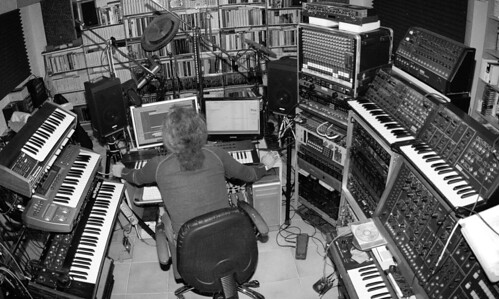How Technology is Changing Music to fit Inside Streaming's New Box

Technology shapes and forms. A Roman war chariot could still ride to battle on a modern road. Songs are typically about 3 minutes long because a 78rpm record held about three minutes of sound per side. So it shouldn't be a surprise streaming—a new technology for distributing music—pounds songs, business models, and production methods into new shapes fitting a new medium.
How would artists respond to near zero digital production costs, zero marginal distribution costs, and streaming's pay per play business model? Uniquely, as described in great detail in the podcast WS More or Less: Why Albums are Getting Longer.
Michael Jackson's Thriller album had nine tracks and runs at just over 42 minutes. Chris Brown released Heartbreak on a Full Moon, an album with 45 tracks and runs well over 2 hours. Albums are getting longer.
Why? You get what you measure.
1500 plays or streams of a track from a single album counts as a record sale. So the longer the album the fewer people have to listen to the whole thing to increase record sales. Record sales are how chart rankings are determined. Doing better in the charts gets you more exposure, which gets you more streams, which gets you more exposure, which gets you more money. And so on.
Game the system, rule the world. Streaming almost doubles every year. 251 billion songs were streamed last year. Streaming is a game you want to win.
Hip Hop leads the way by adopting new production strategies based on modern digital technologies. Hip Hop releases more music per year by working as a worldwide team. Teams of producers and song writers collaborate together to produce more music than any one band could every hope to produce.
Increasing production is the new internet-driven digital production model. More people produce more content. More content in the streaming age means more money. We see this same evolution in games, video, and books. Kindle Unlimited, for example, has changed book publishing. A traditional band can't hope to keep up using traditional artisanal methods.
The structure of songs is also changing to game the system. For a song to count as a stream you must listen for 30 seconds. Artists are doing everything they can to get your attention for 30 seconds. After that, who cares?
It's no longer "get to the chorus don't bore us." What's happening is intros are becoming an audio emoji encoding of what to expect in the rest of the song. The example given in the podcast is Despacito, a hit song approaching 5 billion views on YouTube.
Despacito starts with a Puerto Rican guitar riff that let's you know it's a latin ballad, that's followed by shout-outs that tell you it will have some reggae tones, followed by crooned vocal melody that let's you know it's a pop song, followed by some electronic sounds that let's you know it's modern, and so on. Only after that does the song really start. It's like watching a movie trailer counting as watching the movie. In a Chainsmokers song the first 30 second verse never repeats, it just hooks you in.
Is this the shape of things to come? Inevitably. We're seeing internet economics fundamentally alter everything. There's no escape.
WS More or Less: Why Albums are Getting Longer is a fun and insightful listen. Highly recommended.




